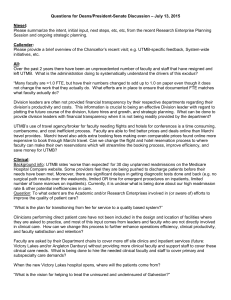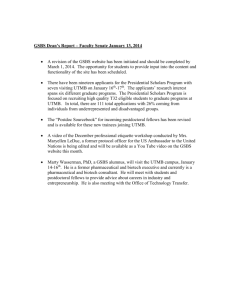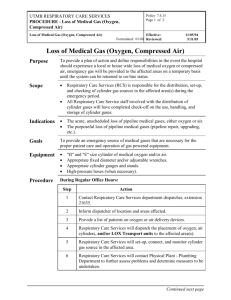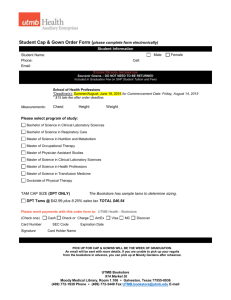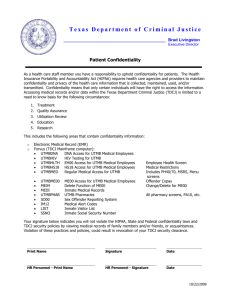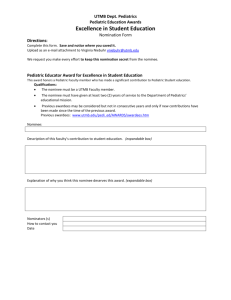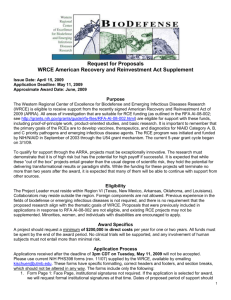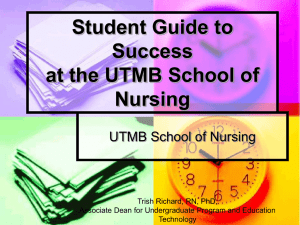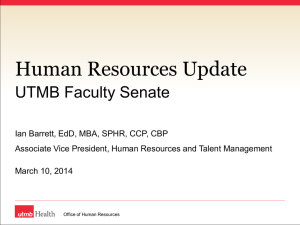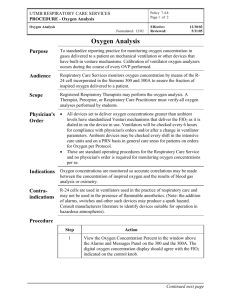Infection Control
advertisement
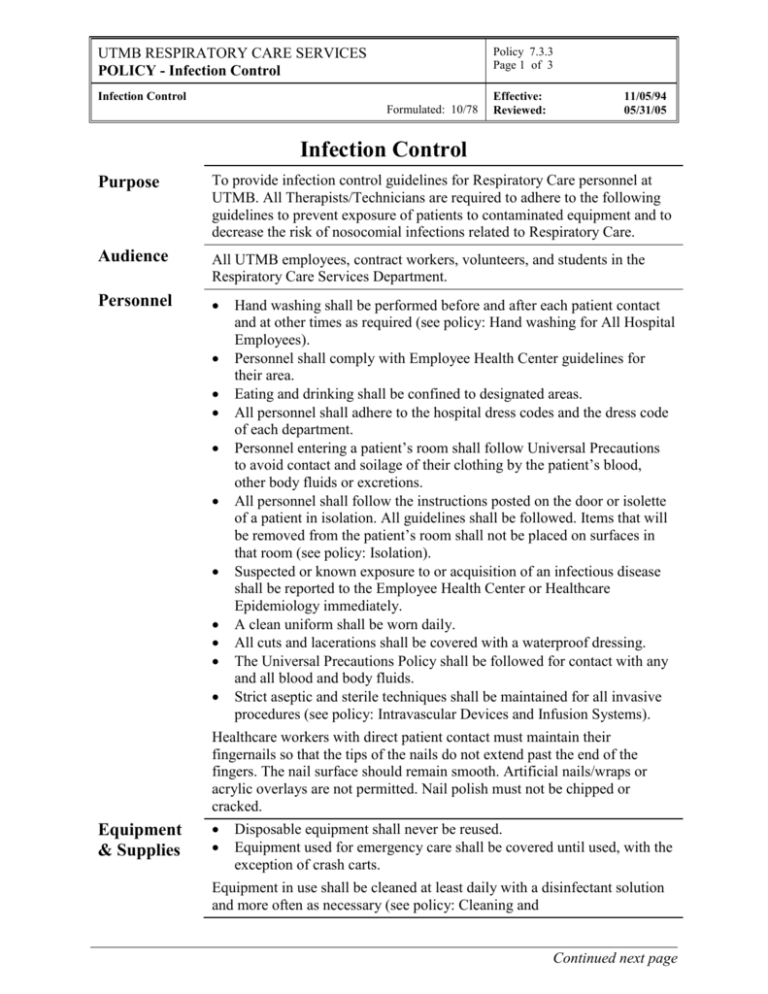
Policy 7.3.3 Page 1 of 3 UTMB RESPIRATORY CARE SERVICES POLICY - Infection Control Infection Control Formulated: 10/78 Effective: Reviewed: 11/05/94 05/31/05 Infection Control Purpose To provide infection control guidelines for Respiratory Care personnel at UTMB. All Therapists/Technicians are required to adhere to the following guidelines to prevent exposure of patients to contaminated equipment and to decrease the risk of nosocomial infections related to Respiratory Care. Audience All UTMB employees, contract workers, volunteers, and students in the Respiratory Care Services Department. Personnel Hand washing shall be performed before and after each patient contact and at other times as required (see policy: Hand washing for All Hospital Employees). Personnel shall comply with Employee Health Center guidelines for their area. Eating and drinking shall be confined to designated areas. All personnel shall adhere to the hospital dress codes and the dress code of each department. Personnel entering a patient’s room shall follow Universal Precautions to avoid contact and soilage of their clothing by the patient’s blood, other body fluids or excretions. All personnel shall follow the instructions posted on the door or isolette of a patient in isolation. All guidelines shall be followed. Items that will be removed from the patient’s room shall not be placed on surfaces in that room (see policy: Isolation). Suspected or known exposure to or acquisition of an infectious disease shall be reported to the Employee Health Center or Healthcare Epidemiology immediately. A clean uniform shall be worn daily. All cuts and lacerations shall be covered with a waterproof dressing. The Universal Precautions Policy shall be followed for contact with any and all blood and body fluids. Strict aseptic and sterile techniques shall be maintained for all invasive procedures (see policy: Intravascular Devices and Infusion Systems). Healthcare workers with direct patient contact must maintain their fingernails so that the tips of the nails do not extend past the end of the fingers. The nail surface should remain smooth. Artificial nails/wraps or acrylic overlays are not permitted. Nail polish must not be chipped or cracked. Equipment & Supplies Disposable equipment shall never be reused. Equipment used for emergency care shall be covered until used, with the exception of crash carts. Equipment in use shall be cleaned at least daily with a disinfectant solution and more often as necessary (see policy: Cleaning and Continued next page Policy 7.3.3 Page 2 of 3 UTMB RESPIRATORY CARE SERVICES POLICY - Infection Control Infection Control Formulated: 10/78 Equipment & Supplies Continued Effective: Reviewed: 11/05/94 05/31/05 Reprocessing of Patient Care Equipment and Medical Devices). Ventilators that are discontinued from patient use shall be wiped down with Cavicide prior to delivery to the department for reprocessing. Processing reusable equipment - all equipment to be sterilized or disinfected shall be thoroughly cleaned to remove all blood, tissue, food or other residue. Processed reusable equipment shall be checked prior to use for appropriate packaging. Large pieces of respiratory care equipment shall be covered with dust covers in the storeroom. There shall be a system for rotating stock. Clean equipment and dirty equipment shall not be stored in the same area. When equipment and instruments are soaked in activated Glutaraldehyde, the container shall be covered and the activation date and the expiration date of the solution written on the lid. (see policy: Cleaning, Disinfection and Sterilization of Patient Care Items) All clean and sterile supplies shall be stored on shelves or pallets 8-10” off the floor. Clean and sterile supplies shall be dust-free. Any equipment removed from an isolation room will be wiped down with Cavicide and covered with an equipment bag and clearly labeled that it is contaminated before transporting to the department for reprocessing. Laryngoscope Blades Laryngoscope blades will be cleaned and then disinfected with a high level disinfectant in Respiratory Care Services. The blades will be packaged in a plastic wrapper. Blades shall be returned to Respiratory Care Services if their plastic wrappers are not intact or are absent. Plastic wrappers shall be removed immediately prior to use. Healthcare workers shall take care not to touch the end of the blade before or during use. Respiratory Care Services will check the lights on the laryngoscope blades prior to dispensing them to patient care units. Patient Care Multi-dose vials of medication shall be dated when opened and discarded according to the UTMB Pharmacy policy. Medications shall be supplied in single-dose vials when possible. Gloves shall be worn during contact with mucous membranes or when cleaning items contaminated with patient’s blood, other body fluids or excretions. Hand washing shall always be performed after removal of gloves. Perform tracheostomy procedures under sterile conditions. When changing a tracheostomy tube use aseptic technique and replace the tube with one that has undergone sterilization or high-level disinfection. Continued next page Policy 7.3.3 Page 3 of 3 UTMB RESPIRATORY CARE SERVICES POLICY - Infection Control Infection Control Formulated: 10/78 Procedures Effective: Reviewed: 11/05/94 05/31/05 Floors and horizontal surfaces in the department shall be cleaned at least daily. Resuscitation bags shall be disposable or shall be sterilized or subjected to high-level disinfection between patients. Disposable single use items shall not be reprocessed and reused unless part of the UTMB reprocessing program. All contaminated reusable equipment shall be decontaminated by appropriate means prior to being reprocessed (i.e., in the decontamination room). Persons who decontaminate equipment shall wear gloves. When equipment cannot be decontaminated prior to servicing, a sticker displaying the biohazard symbol shall be attached. The area(s) contaminated shall be written on the front of the sticker. Opened bottles of saline and water shall be dated and discarded at the end of 24 hours. The drying cabinet shall be thoroughly cleaned with a disinfectant-detergent solution weekly and more often as needed. Corresponding Policies Follow procedures as outlined Healthcare Epidemiology Policies and Procedures: #2.24 Respiratory Care Services. http://www.utmb.edu/policy/hcepidem/search/02-24.pdf Cleaning and Reprocessing of Patient Care Equipment and Medical Devices, Policy #01.05; http://www.utmb.edu/policy/hcepidem/search/01-05.pdf Intravascular Devices and Infusion System, Policy #01.18, http://www.utmb.edu/policy/hcepidem/search/01-18.pdf Employee Health Center: Communicable Disease Control, Policy #01.09, http://www.utmb.edu/policy/hcepidem/search/01-09.pdf Disposable Patient Care Items, http://www.utmb.edu/policy/hcepidem/search/01-07.pdf Hand washing For All Hospital Employees, http://www.utmb.edu/policy/hcepidem/search/01-14.pdf Isolation, http://www.utmb.edu/policy/hcepidem/search/01-19.pdf Exposure Control Plan/ Universal Precautions, http://www.utmb.edu/policy/hcepidem/search/01-32.pdf RCS Policy and Procedure Manual, Processing and Sterilization Protocol, #7.3.6. References CDC Draft Guideline for Prevention of Nosocomial Pneumonia. Notice of Comment Period. 59 Fed. Reg. 4980-5022 (1994). Centers for Disease Control & Prevention: Guideline for Prevention of Nosocomial Pneumonia, Respiratory Care 1994, 39(12); 1191-1236 Guideline for Prevention of Nosocomial Pneumonia. Infection Control Hospital Epidemiology 1994; 15: 588-627.
